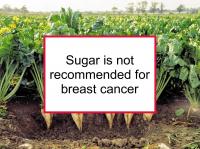By sugar, we mean ordinary table sugar (sucrose). This category also includes extremely sweet foods incorporating high levels of sugar such as soda, cookies, candy and desserts. High sugar intake can contribute to high body mass index (BMI) and type 2 diabetes, which in themselves can increase breast cancer risk.
A sucrose-rich diet has been demonstrated to increase the mutation frequency in rat colon cells in a dose-dependent manner. Added sugar has been found to be associated with increased risk of pancreatic, gastric, colorectal and prostate cancer. Moderate use of honey as a sweetener instead of table sugar could be beneficial to overall health and reduce cancer risk.
Breast cancer-related effects of consuming sugar
Consumption of added sugar, sugary sweets and sodas, and high-sugar desserts has been shown to be associated with increased breast cancer risk and reduced survival, including for women who are not overweight and not insulin resistant.
Sugar promotes mammary tumor growth and metastasis in animal models
One study evaluated carcinogen-induced mammary tumors in rats fed diets containing high levels of either sugar (dextrose or sucrose) or starch (wheat, rice or potato starch). Rats fed high-sugar diets were found to develop significantly more mammary tumors than those fed high-starch diets, at both high and low levels of dietary fat. Mice bearing HER2 overexpressing (HER2+) or triple negative (ER-/PR-/HER2-) tumors and fed sugar equivalent to the average U.S. sugar intake experienced faster tumor growth and metastasis than control mice in another study. The same study reported that the sugar-enriched diet doubled the number of lung metastases in mice prone to metastatic spread.
Sugar consumption contributes to known breast cancer risk factors
Sugar consumption is associated with other known risk factors for breast cancer in addition to obesity and type 2 diabetes. Sugar consumption increases systemic inflammation. Girls who are frequent consumers of sugar-sweetened beverages are more likely to experience early menarche (first period) at a relatively young age. Sweetened soda consumption has been shown to increase the level of circulating estradiol (the most important estrogen) in premenopausal women. In addition, high sugar consumption is associated with increased breast density.
Sugar contributes to breast cancer growth and metastasis at molecular level
Consumption of simple sugars has been shown to cause oxidative DNA damage in healthy adults. Sugar, in combination with associated elevated concentrations of insulin, has been shown to prevent programmed cell death, thereby permitting proliferation of cancer cells. High blood sugar has been demonstrated to stimulate breast cancer cell motility (the ability to move, which is required for invasion and metastasis) and migration. Cancer cell glucose uptake has been associated with resistance to chemotherapy.
Population studies link sugar and breast cancer
Various epidemiological studies have reported links between sugar intake and breast cancer (there appear to be fewer links between artificial sweeteners and breast cancer):
- A large prospective 2024 study reported that aspartame (NutraSweet, Equal) consumption was not linked to increased breast cancer risk.
- A 2024 Italian study found that urinary sucralose (Splenda) was linked to a higher risk of premenopausal breast cancer; no associations were found for aspartame, acesulfame, saccharine, sucralose, cyclamate, or steviol glycosides.
- A 2023 study reported that among premenopausal Mexican women, those drank one or more sugar-sweetened beverages per day had 1.78 times the risk of breast cancer as those who drank one or fewer per month.
- A 2023 meta-analysis of data from previous studies found no relationship between exposure to artificial sweeteners and breast cancer incidence.
- A prospective study found that sugar-sweetened beverage consumption after diagnosis was associated with higher breast cancer‐specific mortality (artificially-sweetened beverage intake was not).
- A French prospective study reported that women in the highest quartile of total sugar intake were 51% more likely to develop breast cancer than those in the lowest quartile. The results held after adjusting for any weight gain during the follow-up period.
- A U.S. case-control study found that consumption of sweets, particularly desserts, was associated with an increased risk of breast cancer.
- An Italian case-control study found that women with the highest intake of desserts (including cookies, brioches, cakes, pastry puffs and ice-cream) and sugars (including sugar, honey, jam, marmalade and chocolate) had increased risk of breast cancer. The results held when adjusted for BMI and total calorie intake.
- A Mexican case-control study found that carbohydrate intake was positively associated with risk of breast cancer for both premenopausal and postmenopausal women after adjusting for total calorie intake. The strongest associations were observed for sucrose and fructose intake.
- Another Italian case-control study found that breast cancer risk increased with increasing consumption of bread, pasta and refined sugar.
- A Japanese case-control study found that breast cancer risk was positively associated with higher intakes of bread, cake, and soft drinks made with sugar.
Additional comments
The idea that breast cancer is "fed by sugar" is at best a partial explanation for the association between sugar consumption and breast cancer risk. Sucrose is converted to glucose by enzymes in the digestive tract. All of our cells require energy in the form of glucose to survive. It is true that cancer cells typically consume glucose at a much higher rate than normal cells and compounds that cause inhibition of glucose uptake by tumor cells may inhibit their growth and viability. However, cancer cells will obtain glucose from a variety of foods in the diet, not just sugar. Sugar acts in direct ways to promote breast cancer, not just as a fuel for cancer cell metabolism and growth.
Sources of information provided in this webpage
The information above, which is updated continually as new research becomes available, has been developed based solely on the results of academic studies. Clicking on any of the underlined terms will take you to its tag or webpage, which contain more extensive information.
Below are links to 20 recent studies concerning this food and its components. For a more complete list of studies, please click on sugar.
